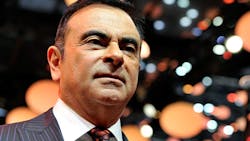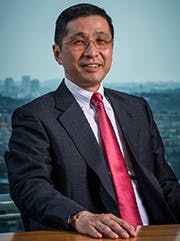Ghosn Steps Back from Nissan to Focus on Mitsubishi Turnaround
Carlos Ghosn handed over the day-to-day running of Nissan Motor Co. (IW 1000/25) to Hiroto Saikawa, who will take the mantle of president and chief executive officer while his long-time boss focuses on revamping struggling affiliate Mitsubishi Motors Corp. (IW 1000/209)
Ghosn, 62, will remain chairman of Nissan, a title he also holds at alliance partners Renault SA and Mitsubishi Motors. He’ll stay as CEO of Renault as the transformation of the French carmaker isn’t finished, he said in an interview, with the current midterm plan ending in 2018. Saikawa will assume charge at the Japanese company April 1.
“There’s a point in time where you have to be realistic about how much things you do and you can do well. This is the trigger,” Ghosn said at Nissan’s headquarters in Yokohama, Japan on Thursday. “There’s a moment when you have to pass the baton to someone else. I’ve always said I would love to have a Japanese to be my successor and Saikawa-san is somebody I have been grooming for many years.”
The elevation of Saikawa, 63, a lifelong Nissan employee who joined the automaker from Tokyo University in 1977, takes place as Ghosn steps away from the day-to-day operations to devote more time to managing an alliance that sold just shy of 10 million vehicles last year, ranking it behind General Motors Co. among the world’s biggest carmakers. Nissan bought a 34% stake in Mitsubishi Motors in the wake of a fuel-rating cheating scandal.
Strong Japanese Leadership
“It’s really been one man holding the alliance together, so what happens when that one man is no longer there?” said Maryann Keller, an independent auto analyst in Stamford, Conn. “For the alliance to continue post-Carlos Ghosn, there’s got to be strong Japanese leadership inside Nissan that believes there’s an advantage in making it happen.”
The automotive world is also more tumultuous than it was when Ghosn arrived at Nissan more than two decades ago, Keller said. Ghosn’s former top lieutenant at the alliance, Carlos Tavares, is now spearheading efforts by Peugeot SA to buy the Opel unit of General Motors, she said, citing one example. Serious competitive threats are sprouting daily as self-driving, connected cars and electrified powertrains proliferate.
“It’s appropriate for Ghosn to step away from running the business day-to-day, and to devote all his time to thinking about the cosmic issues confronting the business,” Keller said. “It’s a different game today,” she said. “You can’t play it the same you played it in 1995.”
Ghosn, credited with turning around Nissan after taking over as chief operating officer in 1999, will look to do the same at Mitsubishi Motors. The executive had restored Nissan to profitability by breaking up its so-called keiretsu network of suppliers, shutting plants and leveraging the alliance with Renault, earning himself the nickname “Le Cost Killer.”
Capturing China's EV Boom
Among the first results of cooperation between the three companies, Renault, Nissan and Mitsubishi Motors will share a common platform for a budget electric vehicle in China, which will allow the three companies to “capture the EV boom” there, Ghosn said.
Nissan’s shares slid 0.6%, while Mitsubishi Motors gained 0.8% in Tokyo trading as of 1:31 p.m. The benchmark Topix Index fell 0.2%.
For Saikawa, the promotion to CEO marks the apex of a 40-year career with Nissan that has seen him hold various senior management positions, including being chief of Nissan’s businesses in the Americas and Europe, as well as executive vice president of purchasing. Between April 2013 and October 2016, he was Nissan’s chief competitive officer overseeing global purchasing, manufacturing, supply chain management, research and customer satisfaction.
Saikawa’s Procurement Background
“Carlos Ghosn changed Nissan, especially reorganizing procurement -- it is a very important thing,” which makes Saikawa a good choice to lead Nissan, Takeshi Miyao, an analyst with Tokyo-based market researcher Carnorama, said by phone. “Saikawa-san’s background is in procurement. He has a very special intelligence and skill in a matter that’s very important for a carmaker.”
He also served on the board of Renault, Nissan’s biggest shareholder, between 2006 and 2016. During Saikawa’s tenure, the alliance came under pressure from the French state, which had increased its stake in Renault without informing Ghosn.
Saikawa led Nissan’s negotiations with Renault and the French government in 2015 to address an imbalance in the alliance’s ownership structure, in which the more profitable Japanese partner had no voting rights for its stake in the French carmaker. A crisis was averted after the French government pledged not to interfere in Nissan’s governance.
“I don’t think a merger is on the table,” said Ghosn, who will continue to lead the alliance. “It has been said very clearly, many times, particularly by Nissan during the discussion with the French state that there will be no merger as long as the French state remains a shareholder of Renault.”
By Ma Jie and Kae Inoue
About the Author
Bloomberg
Licensed content from Bloomberg, copyright 2016.

